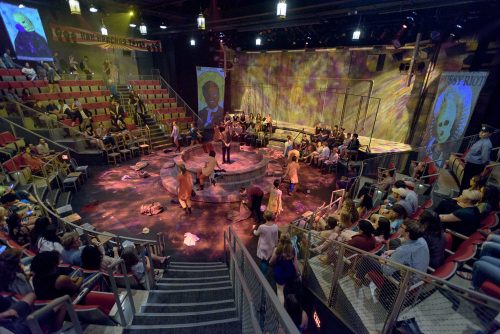
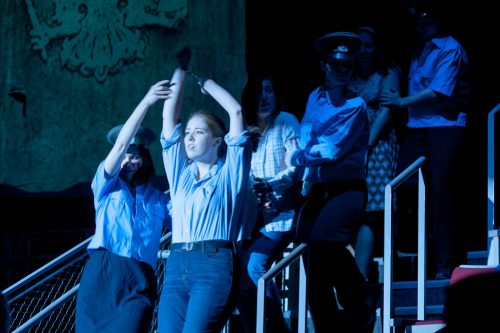
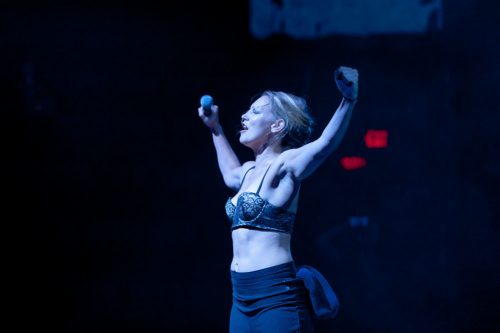
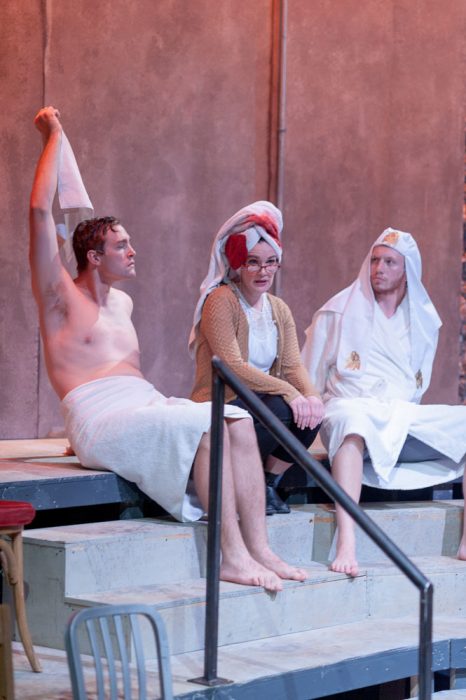
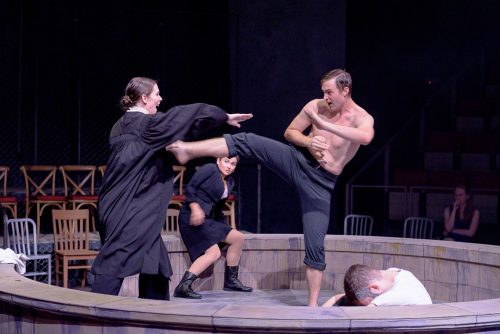
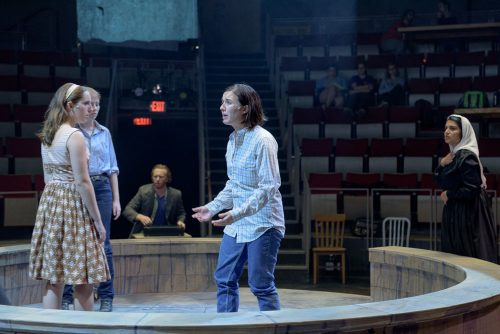
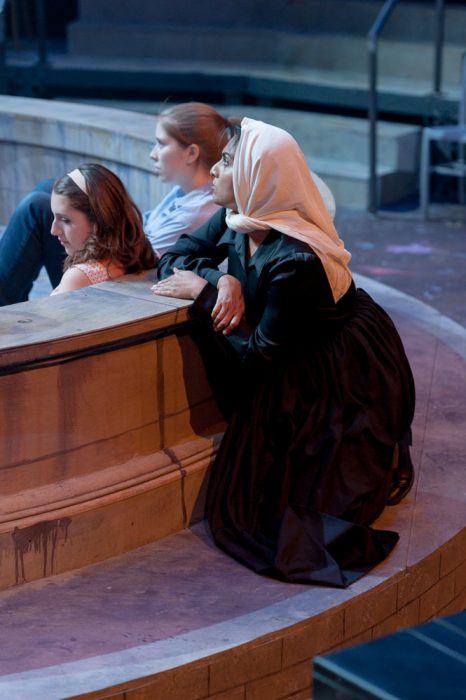
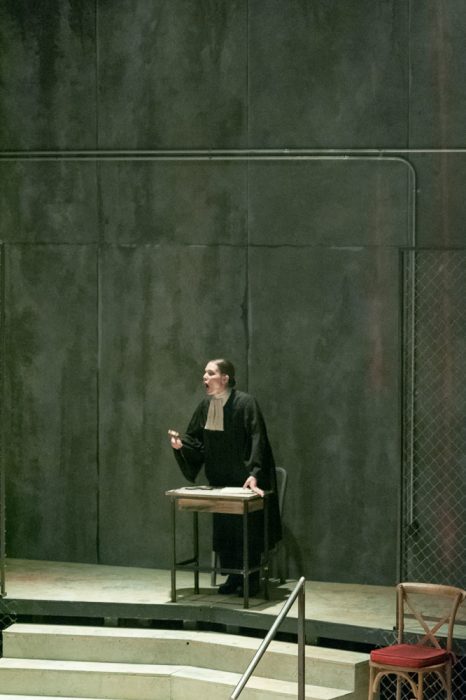
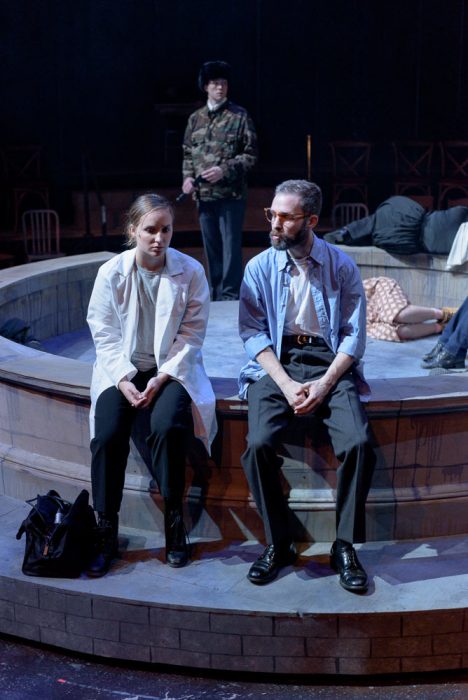
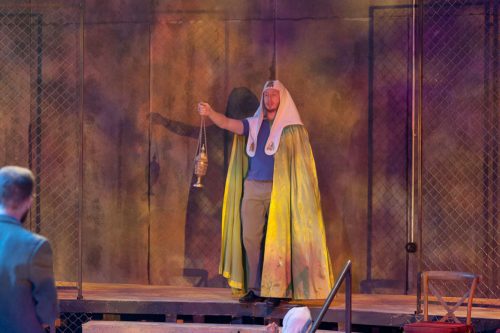
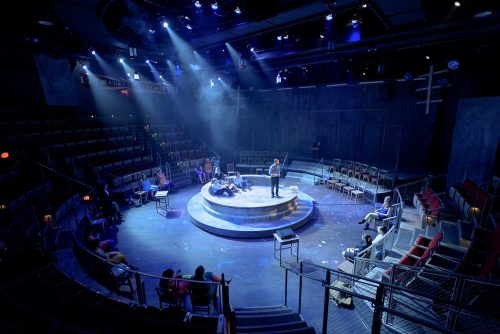
‘It’s Not Just History’: An Atelier Course Explores Princeton’s Slavery Ties in Song
In the fall semester, alumni Peter Mills ’95 and Cara Reichel ’96 of Prospect Theater Company taught a Princeton Atelier seminar in which undergraduates created original musical theater works inspired by the work of the Princeton & Slavery Project. (Readings of a one-act musical drawn from their compositions will be presented at Nassau Hall Jan. 13.) In this audio feature, PAW intern Douglas Corzine ’20, a student in the course, takes us inside the challenges of telling these compelling stories in musical form.
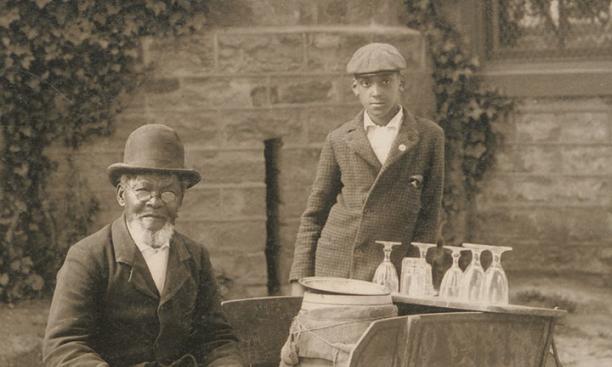
Listen to the full transcript from Princeton Alumni Weekly here.
LABUTE NEW THEATER FESTIVAL Returns to 59E59 Theaters
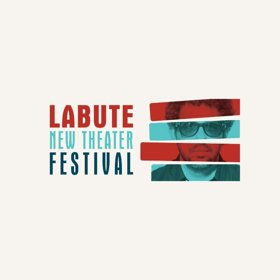
59E59 Theaters (Val Day, Artistic Director; Brian Beirne, Managing Director) welcomes the return of St. Louis Actors’ Studio with the LaBUTE NEW THEATER FESTIVAL, featuring the NYC premiere of one-act plays, including PERCENTAGE AMERICA by Carter W. Lewis. The LaBUTE NEW THEATER FESTIVAL begins performances on Thursday, January 11 for a limited engagement through Sunday, February 4. Press Opening is Sunday, January 14 at 7:30 PM. The performance schedule is Tuesday – Friday at 7:30 PM; Saturday at 2:30 PM and 7:30 PM; and Sunday at 2:30 PM. Please note: there is an added performance on Sunday, January 14 at 7:30 PM. Performances are at 59E59 Theaters (59 East 59th Street, between Park and Madison Avenues). Single tickets are $25 – $35 ($24.50 for 59E59 Members). To purchase tickets, call Ticket Central at (212) 279-4200 or visit www.59e59.org.
In PERCENTAGE AMERICA, a couple on a first date, hoodwinked by each other’s dating profile, parse a story on the local evening news for “alternative facts.”
The cast features Autumn Dornfeld (The Graduate on Broadway); Kelly Schaschl (NY debut); Spencer Sickmann (Last Days of Judas Iscariot for LA’s Lost Angels Productions); and Chauncy Thomas (To Kill a Mockingbird at Bay Street Theatre).
The design team includes Patrick Huber (scenic design); Jonathan Zelezniak (lighting design); andCarla Evans (costume and prop design). The Production Stage Manager is Seth Pyatt.
Carter W. Lewis (playwright, PERCENTAGE AMERICA) is currently serving as Playwright-in-Residence at Washington University. Prior to that he was Literary Manager & Playwright-in-Residence for The Geva Theatre Center (NY). Carter was also co-founder and Resident Playwright for Upstart Stage in Berkeley, California. He is the winner of several national playwriting awards including The Julie Harris – Playwriting Award, The State Theatre – Best New American Play, The Cincinnati PlayhouseA. Rosenthal New Play Prize (1996 & 2001), New Dramatist Playwriting Award, Playwright’s Center Jerome Residency, The Blanche and Irving Laurie Foundation Award (2003), and he is a two-time nominee for the American Theatre Critics Award. A sample of theaters that have produced his work include The Cincinnati Playhouse in the Park, Syracuse Stage, The Source Theatre, Florida Stage, Studio Arena Theatre, Arizona Theatre Company, The Round House Theatre, Merrimack Repertory Theatre, The Sacramento Theatre Company, The Ensemble Theatre of Cincinnati, The Phoenix Theatre, The Barksdale Theatre, American Stage, The New Repertory Theatre, The State Theatre Company, Florida Repertory Theatre, The Geva Theatre Center, The Repertory Theatre of St. Louis, The Berkshire Theatre Festival, San Diego Repertory Theatre, The Magic Theatre, and The Royal Court Theatre in London. His published works include Art Control, No-Preying, A Geometric Digression of the Species, Soft Click of a Switch, An Asian Jockey in Our Midst, and The One-Eyed Man is King. Other plays by Carter W. Lewis include Golf with Alan Shepard, Picasso Does My Maps, Longevity Abbreviated for Those Who Don’t Have Time, Women Who Steal, Men on the Take, American Storm by Integrity Out of Molly Brown, Kid Peculiar, Ordinary Nation,Evie’s Waltz, The Storytelling Ability of a Boy, The Cha Cha of a Camel Spider, Hit Story, Camden & Lilly,The Hummingbird Wars, The Gun in the Floor, and Echo Location.
‘Draw the Circle’ Puts a Surprising Frame on a Transgender Story
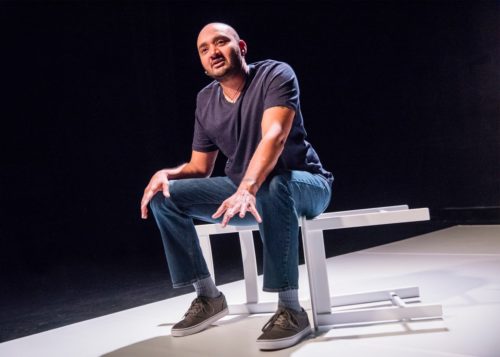
Mashuq Mushtaq Deen has a good story to tell in “Draw the Circle,” and a fresh way to tell it. It’s an autobiographical solo show about gender transition in which he plays his parents, his classmates, his doctors and his girlfriend – everyone but himself.
By the end he’s fully there, along with projected statistics about the rising U.S. murder rate of transgender people. This activist theater is molded from the raw material of being born to traditional Muslim Indian immigrants to the United States and assigned female; before the show starts, we see a photo of Deen as a young girl.
This 80-minute piece is running in rep at the Atlas Performing Arts Center with another hot-button solo act, Dan Hoyle’s “The Real Americans” – a survey of strangers Hoyle met during fact-finding road trips through the heartland. Hoyle may be a slightly more limber mimic than Deen, but Deen’s tale unspools more naturally.
Deen’s problem for years was feeling invisible (and worse), which is how we experience him as he takes on the voices of the people who give us his history of gender transition. Dressed in jeans and a blue T-shirt, he chronicles, with surprising empathy, not just what it was like to slowly, painfully come to terms with transition, but what it was like for loved ones who shunned everything about it. The father’s a card able to tell jokes, but the mother is sheer distress and shame. She frets about what the relatives back in India will think and laments the daughter – Shireen was Deen’s name, we are told – she feels she has lost.

Viewpoints come from a wide-eyed niece and, perhaps most poignantly, from Molly, who fell in love with Shireen and was then challenged by Shireen’s evolution to Deen. The names of each character are helpfully projected on the back wall; Deen does good work switching vocal patterns and postures, but he’s more compassionate than chameleonic in his characterizations.
Director Chay Yew – a playwright himself, and artistic director of Chicago’s Victory Gardens Theater – keeps the lean performance percolating briskly. It’s all about the information: the stage is a bare white square floor furnished with only a plain white chair. There is nothing else but the names on the screen, and the narrative.
Trans playwrights are still emerging, which puts Deen’s show in the vanguard here (and let’s credit Mosaic Theater for boldly expanding its repertoire all the time). The story’s framework is simple yet striking, and more than a novelty: it’s an apt, big-hearted way to puzzle together many pieces of Deen’s journey. “Draw the Circle” does not sugarcoat his despair or incidents of violence, yet it rather amazingly reaches back to retrieve people who easily could have been cut out for life. The wrathful moment confronting us with the ongoing violence against trans people does not define the tone of this personable, entirely approachable show. Inarguably, though, it’s that flicker of wrath that gives the piece its purpose.
Draw the Circle , written and performed by Mashuq Mushtaq Deen. Directed by Chay Yew. Lights, Mary Louise Geiger and E-Hui Woo; set, Chay Yew; sound design, Matthew M. Nielson. Through Dec. 24 at the Atlas Performing Arts Center, 1333 H St. NE. Tickets $35-$65. Call 202-399-7993 or visit mosaictheater.org.
Review by Nelson Pressley for The Washington Post.
The Journey of “Radioman”
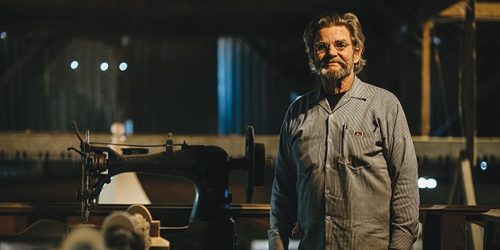
“This play is so important. I’ve never read anything like this.”
“Same shit, different war”
“My father. My uncle. My sister.”
“You gotta get through it somehow.”
“It’s a tense time right now.”
“It ain’t just a woodworking shop.”
“PTSD.”
“You gave words to something I experience every day.”
“I feel this enormous weight.”
“Thanks for laughing occasionally.”
“That was a good cold reading.”
“Damn, honestly? I’m gonna go have drinks.”
“I’m Eric Hollenbeck. I was the radioman.”
Pieces of conversation sail across a hot room during the second reading of Radioman, a visceral monologue-style play born from the poetry of Vietnam combat veteran and Eureka native Eric Hollenbeck. The reading is at Art Share, a hip and grungy multifunctional space in downtown Los Angeles’ freshly gentrified Arts District. Graffiti litters the neighborhood; spray paint color blooms along streets and sidewalks and across brick walls reaching up to the blue Southern California sky.
The play’s director, assistant director, writer, producers and publicist are assembled, along with eight actors and a collection of folks from theater companies engaged in this wildly collaborative production. After a flurry of introductions, everyone gathers around big tables pulled into a circle.
Recently transplanted New York playwright James McManus checks in with the actors. Unlike other readings, in which a script is rehearsed ahead of time, this is a cold read. McManus says this way he can hear the imperfections in his writing. “Sometimes,” he says, “the actors are so good that they can make bad writing sound OK.”
McManus explains how he wants the different verses of the monologues to go down. He has merged Hollenbeck’s poems with stories from other war veterans. The result is a series of biting, dialect-heavy monologues punctuated with refrains and one-liner conversations that come like a rapid fire ping pong match. He slaps the table with a flat palm, urging the actors to dig in and find the cadence to his writing.
“Read them one line after another after another on top of each other as much as possible,” he says. “Do the best you can, then go ahead and let that fly.”
The monologues begin with the radioman — Eric Hollenbeck — in the jungle in Vietnam smoking a cigarette and cradling a dead soldier’s leg. The piece then takes off into the wilds of the human war experience, from Vietnam until now. The actors read in turn. Soon they pick up the gritty, thumping rhythm of McManus’ words. There is ache, anger, grief and humor. There’s also hope. It’s almost musical at times, as voices echo along the brick hallways of the old industrial building.
Read the full article from the North Coast Journal of Politics, People, and Art here.